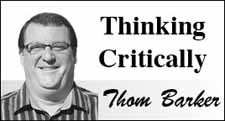Next year school divisions across the province will pilot a new science curriculum for Grade 11. Physics 20 and Chemistry 20 will be combined into one class, Physical Science 20, making way for two new courses, Health Sciences 20 and Environmental Sciences 20.
In 2014-2015, this will be followed by changes at the Grade 12 level including a new Earth Science 30 course.
The reasoning behind the shift is basically to make science more relevant to kids. To that end, there is a stronger emphasis on career paths.
The other thing the new curriculum intends to do is foster "understanding of western, traditional and other knowledge systems."
I am 100 per cent behind making science more relevant. While not perfect by any means, at any given time humanity's best hope is good, sound science.
I also believe that all knowledge is valuable and would never advocate for censorship in any form.
Nevertheless, there are certain things about the shifting high school science landscape that concern me.
First of all, "exploring and understanding western, traditional and other knowledge systems" sounds suspiciously to me like the back door young Earth creationists have been looking for to introduce their alternative "science," to teach the so-called "controversy" as it were.
Granted this kind of political tactic to introduce pseudoscientific mumbo jumbo into science curricula is much more prevalent south of the border than it is here (or at least our fringers are not as obnoxious as theirs), but I worry about the curriculum lending legitimacy to non-scientific concepts.
This is particularly concerning in the health sciences stream where non-evidence-based quackery is already making inroads into eroding science-based medicine. I have written at length about this in the past.
I am assured this is not the case, but so far, all that I have seen is very basic descriptions of what the content will be. I am eager to see the specific changes.
Teachers, of course, have a lot of discretion, not with what is presented, but how it is presented. I have no problem with exposing students to non-scientific concepts. They are out there and there is little hope of fighting them if we are not aware of them. If it is presented as legitimate, however, we will have a big problem.
The second thing that concerns me is the shift toward commercial science as opposed to basic science. I get the fact that for the majority of students the primary concern is learning skills that will get them a good job. The problem is, it's not just in high schools, it is a trend in society in general. For example, the National Research Council, venerated for decades as a bastion of scientific discovery, is now almost entirely engaged in serving industry.
While some economic, short-term good could come from that, it is almost certainly unsustainable. Practical science exists only on a sound foundation of basic science, the applications of which are almost never known until the work is done.
I may be worrying over nothing, but I will be watching closely.




